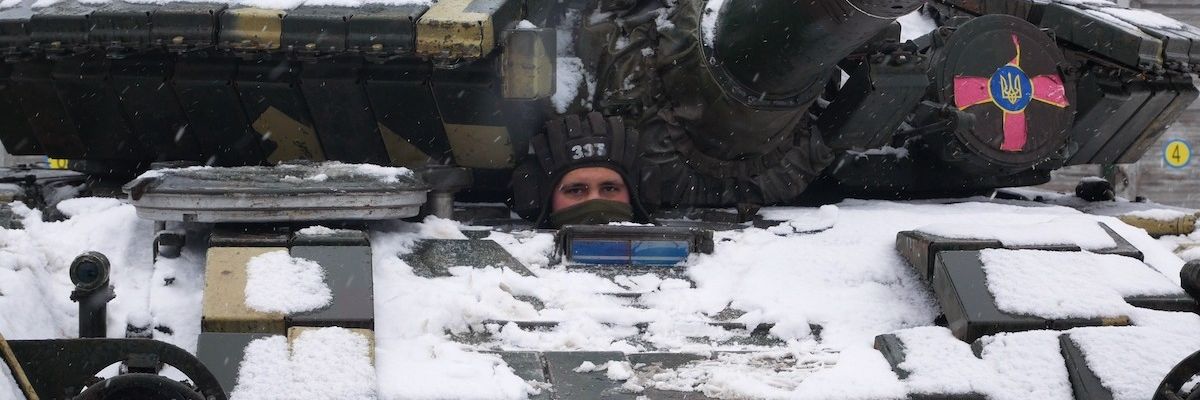Russia has entered a war of choice in Ukraine. It was not unexpected but badly under-anticipated in scope, brutality, and impact. It hazards the continent and planet with the specter of a nuclear exchange and has been the generator of immediate global condemnation and pressure.
President Biden has made it clear that the United States has no national interest in a direct war with Moscow. Any escalatory actions risk broadening and spreading the conflict, as President Putin has already demonstrated. Furthermore, an extended war will be disastrous for the economy and civil society of Ukraine, put European stability at risk, and raise the prospect of a nuclear exchange, which — once begun — no one knows how to stop.
Thus far, we have resorted to economic sanctions and claimed that they are more potent than they actually have been. So far. But they are badly needed to support the only acceptable end game to the crisis — a forward and diplomatic solution. For should diplomacy fail, that would leave only surrender by one side, or continued expansion of conflict.
Energy sanctions might work. Putin in the past has shown himself attentive to energy issues, especially price declines. The war allows him to double down with threats to cut Europe off and drive up prices at the same time. NATO and its global friends must take this seriously. Commitments from the United States and others to increase LNG and oil supplies to Europe are essential to counter and corner Putin. Prices are tricky factors to deal with. Large quantities of oil and LNG with at least temporarily subsidized prices by suppliers can face Putin with the choice of continuing a conflict where his economy is in growing jeopardy, or coming to the table to work out a solution.
Further steps on energy are important. Major producers, in addition to providing more oil and gas and reducing prices, should band together for a long-term effort to increase investment in research and development on renewables. It fits their strategy of reserving hydrocarbons for hard to replace uses. It meets 21st century needs for survival and can build technology and use science to assure progress and reduce damage to the globe.
The choice for Putin has to be made apparent and stark: Negotiate, or risk your regime. Facing the prospect of a balanced diplomatic answer, or war, leaves little room for maneuver. To assure that he gets the message, economic pressure should be complemented with careful military reinforcement and positioning. NATO is protected by Article V of the North Atlantic Treaty, which says an attack against one is an attack against all. But credible support for Article V requires fielding a force in NATO countries to make the commitment more than a billboard slogan. The United States so far has moved less than 10,000 troops; Russia is engaged with 200,000.
Negotiations must involve both Ukrainians and Russians. You don’t make peace with your friends but your enemies, as Yitzhak Rabin, Israel’s former Prime Minister, once famously said. The objective must be an end to the conflict and the damage it is wreaking. And there can be no full solution without Russian withdrawal, which makes the task for diplomacy harder. But a future sovereign and independent Ukraine can become as Henry Kissinger has described it — a “bridge” country, both politically and economically.
It could begin with a parallel, balanced relationship for Ukraine with President Putin’s economic sphere and the European Union. There are competent international economists who could fit the pieces of that puzzle together without compromising Ukraine with either body. For many years Ukraine’s own economy was integrated closely in the Soviet Union with that of Russia. Much of the original dispute arose because of a contest for affiliation between the EU and Russia. Politically, Ukraine should continue to enjoy an open door to NATO even if reservations among NATO member states will for the foreseeable future assure there is no universal support for Ukraine to join. It would also be important for the United States and like-minded NATO states not to seek to change the views of those who oppose Ukraine’s membership.
Those now advocating to escalate, expand or extend this conflict to press the West’s perceived advantage over Russia and ultimately affect regime change will do so over an ever-growing number of dead Ukrainians in whose interests they presume to act.
While there are signs that the Russian military has moved or is moving more slowly than expected in Ukraine, Russian tradition is best exemplified in the Chechen wars’ radical use of overwhelming force against civilians and enemy troops alike. The first casualty in war is the truth. Already stories are circulating of heavy Russian losses. We should not count on either under or overreporting as a solace or indicator.
Conflict without diplomacy is gasoline exposed to ignition. Unconditional surrender is not unknown, but Iraq, Afghanistan twice, and Vietnam have proven its evanescence. While it will require painful give and take on both sides, long term neutrality for Ukraine as a bridge country, built on the model of Finland or Austria, is a concept worth generating and implementing.
Crimea is a further challenge. Putin missed an opportunity when he did not sponsor a UN-conducted free and fair referendum there in 2008. It can still be done and should give the right of choice to its inhabitants as we have in so many former colonies which transformed into independent states in the 1960s and 1970s. If the choice, as seems likely, is for Russian speakers to dominate and stay in the Russian Federation, Crimea will settle with an arrangement which could and should be widely accepted.
The alternative to this admittedly hard course of negotiating is too dangerous and difficult to contemplate — a growing war; increasing devastation; a needless, endless and catastrophic risk of nuclear exchanges. The options are clear, and wise leadership will take the hard diplomatic road less traveled for what it can offer and avoid.














